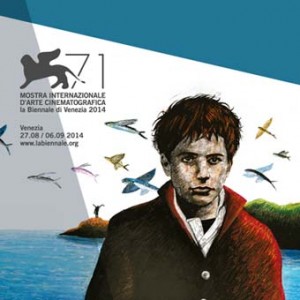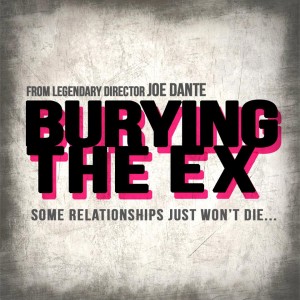La Writers Guild Italia è nata con il preciso intento di valorizzare e di far rispettare, sotto ogni aspetto, il lavoro professionale degli sceneggiatori e quindi anche la loro immagine pubblica. La sezione SCRITTO DA, sotto l’egida di WRITTEN BY, la prestigiosa rivista della WGAw, raccoglie e diffonde la voce degli sceneggiatori italiani, per tentare di supplire alla grande disattenzione con cui gli scrittori e le sceneggiature vengono penalizzati dalle comunicazioni dei festival e degli organi di informazione.

SCRITTORI A VENEZIA
Writers Guild Italia (WGI) incontra gli sceneggiatori italiani presenti con le loro opere alla 71° Mostra Internazionale d’Arte Cinematografica di Venezia (27 agosto-6 settembre)
Alan Trezza ha scritto BURYING THE EX, diretto da Joe Dante. Il film viene presentato nella sezione Fuori concorso e viene proiettato oggi, 4 settembre, alle 22:00 nella Sala Grande e domani alle 17:45 al PalaBiennale.
Burying the ex
written by… ALAN TREZZA
L’intervista in italiano: SCRITTORI A VENEZIA. Alan Trezza
1. Alan, can you pitch your film for us? Just a few lines —
Burying the Ex tells the story of Max, an all-around nice guy, and his overbearing but beautiful girlfriend, Evelyn. Their relationship takes a nosedive after Max invites Evelyn to move in and she turns out to be a controlling, manipulative nightmare. Just as Max is about to break up with her, Evelyn is involved in a freak accident and dies. Several weeks later, Max has a chance encounter with Olivia, a cute and funny girl who just might be his soul mate. That same night, however, Evelyn returns from the grave as an undead corpse and she’s more determined than ever to get Max back…
2. How did you come out with this idea? Most horror movies, more or less openly deal with actual problems of our society. What’s the core of your story – the main deep theme?
It’s true that many of the best horror films, particularly zombie films, use the genre to explore fears and terrors facing our society – whether it be race relations in Night of the Living Dead, fear of disease in 28 Days Later, or mass consumerism seen in the mindless zombies attacking a shopping mall in Dawn of the Dead – but I wanted to do something more personal like a relationship film. I realized there was no better metaphor for a relationship that just won’t end than a zombie that just won’t die.
3. How did it go with Joe Dante? Since you’re also one of the producers of this film, was it you to either reach out to him or choose him? What did he tell you after reading your script the first time? Do you think that a close collaboration between a writer and a director is critical to make a great film?
No one does horror-comedy better than Joe Dante. I have been a fan of his ever since I saw “The Howling” when I was eight-years-old. The werewolf transformation in that film still gives me chills. Even though I was just a kid, I still remember noticing how the music and lighting employed in that scene evoked a sense of dread and foreboding. So, of course, when it came time to find a director, Joe was the first and only name on my list. I submitted the script to him and he read it quickly and asked to meet. I was ready to have a four hour notes meeting where he would just be telling me all of the things he hated and wanted me to change, but to my surprise he said, “I think this is great. I have a few minor tweaks here and there, but I like this, now go find the money so we can make it.”
4. You wrote this film by yourself. It’s your first film and you will go to Venice. How do you imagine your future as a writer?
I can only hope that all of my experiences writing and making films are as thrilling and rewarding as this one.
5. Which are the strongest points of your screenplay? What genre/model were you inspired by?
I think the strongest points of my script are character and dialogue which oddly enough are the weakest points in most horror films. It was for this reason that I focused on them the most. I wanted to write something everyone could relate to (i.e. a broken heart) while offering something new to genre fans.
6. Would you give us your favorite scene as a gift? What is it about?
I’m very fond of the following scene because it’s all about subtext – what the characters aren’t saying. Olivia tells Max that she’s thinking of renting out part of her ice cream shop because her business isn’t doing well. Max says he knew someone who would’ve be interested (himself), but doesn’t think that person’s going to chase that dream anymore. What Olivia is really saying is, “I like you, Max. Give me a chance,” and Max responding, “I don’t think I can.” The scene gets further complicated when Evelyn calls Max and asks him if he loves her right in front of Olivia.
If you want to read the scene, click here Burying the Ex – Scene for WGI.
7. Did you ever think of meeting some kind of target (read: audience) while writing Burying the Ex?
I try not to think about the market while writing because that could be a bad influence. I feel it would hinder some of my more outlandish and frankly, strange (for lack of a better word) ideas. I believe the first place every writer should start is with an idea or story that they themselves are excited and passionate about. Then and only then will they have the courage, stamina and drive to get in the chair and write.
8. How many changes (if any) to the script, needed it to be made while filming? Why?
Funnily enough, the one person who ordered the most changes to the script was me! Most of the changes were to the dialogue and jokes. I saw how the actors were approaching their characters and adding their own spin on them so I tailored the script to their suit performances which made everything much stronger.
9. As you’re both the writer and the producer of Burying the Ex, I guess you were present on the set. Do you believe that a writer should always attend the filming?
I was involved every single aspect of this film’s production. Casting, location scouting, hiring the crew, putting out fires during shooting, reviewing various cuts of the film, and scoring. I loved every single second of it. I believe writers should be on set if and only if they are there as collaborators. I think most writers get a bad reputation because they believe their work must be performed and filmed the exact way it’s written. That might work for some people (i.e. The Coen Brothers, for example, who are true geniuses), but most of time that hurts the work rather than help it.
10. We created the Writers Guild Italia to defend the Italian writers because unfortunately in Italy, our profession is not much protected and recognized. What do you think about it?
I applaud any organization that dedicates itself to supporting and protecting artists.
11. Are there any Italian films that you consider pivotal for your artistic path?
The films of Fellini, De Sica, and Antonioni, particularly “La Strada” and “L’Avventura”, helped me learn the importance of character, drama and mood. “Bicycle Thieves” drives me to tears every time I watch it.
12. What are you expecting from Venice?
I hope that it’s as beautiful and romantic as my wife has been telling me, and that audiences (and critics) appreciate what we were trying to accomplish and enjoy the film.
13. Thank you very much, Alan! Enjoy Venice! Your wife is absolutely right …
Interviewer: David Bellini- WGI Spokesperson in LA


